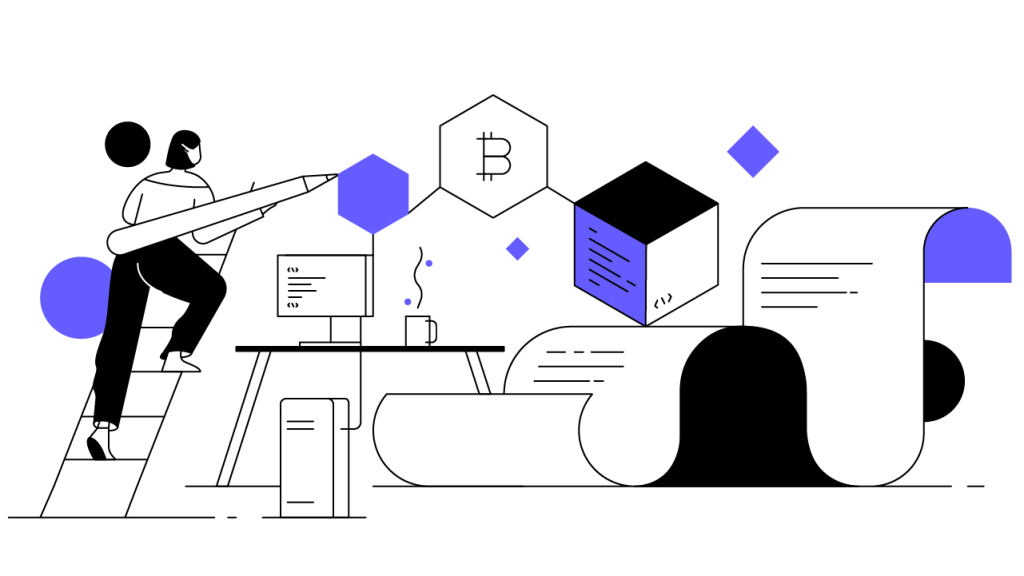Contents
Chainlink (LINK): Oracle Network for Smart Contracts
Chainlink’s oracle solution can bridge the trust gap between off-chain data and the blockchain.
Updated November 1, 2023 • 5 min read

Summary
Chainlink is a decentralized oracle service that offers an effective, reliable, and secure connection to external (off-chain) data that can feed on-blockchain smart contracts. LINK is the protocol’s native token, which requesters use to pay for services on the network, and also acts as a deterrent to nodes against providing faulty data. To learn more about how a Chainlink oracle works, check out Chainlink In Practice.
Chainlink Oracles Solve a Problem
In order to understand Chainlink (LINK) and its role in the blockchain space, it is important to first understand the problem Chainlink was designed to solve. Since its inception, blockchain technology has been designed to solve numerous real-world problems and address many use cases. Smart contracts are one of blockchain’s most promising developments to date.
Smart contracts are computer programs that run within a blockchain protocol. They execute a predefined set of terms in an automated, trackable, and irreversible manner without the need for a third party, and can be built to execute almost any contract imaginable. Nevertheless, they often need data input from outside of the blockchain network in order to execute their predefined terms. Relevant off-chain data might be, for example, providing accurate real-time price feeds from sources like Binance, Kraken, Huobi, CoinMarketCap, and others. Chainlink could use this information to aggregate several price feeds into one real-time and ever-changing price-measurement verification system.
Oracles provide a trusted methodology for a blockchain network or smart contract to retrieve external, real-world data when it's needed. Oracles query, verify, and authenticate external data and then relay it to a smart contract. This technology enables contracts to be executed in a trustless manner, but oracles themselves, and the data they provide, require a high degree of trust, privacy, and security. This is known as the oracle problem, a dilemma Chainlink is working to solve.
Chainlink’s Decentralized Oracle Network
The accuracy and reliability of smart contracts rely heavily on the quality of data that they use to execute their terms. When off-chain data is needed, oracles are critical for smart contracts’ accuracy. Centralized oracles are controlled by a singular entity. Acting as the sole provider of data for a smart contract, centralized oracles require network participants to place a significant amount of trust in the validity of their data. They also represent a single point of failure, which threatens the very security and trustlessness that a smart contract is supposed to have. Many oracle experts contend that a centralized oracle can be more easily corrupted and disrupted than a decentralized oracle. Either way, if an oracle or its data is compromised, so is the smart contract.
Decentralized oracles aim to achieve deterministic, transparent results in the same way that a blockchain network does: by distributing trust among numerous participants. With different data sources, these oracle systems aren’t controlled by a single entity. Decentralized oracle networks (DONs) provide increased security and transparency, which drastically improves smart contract usability.
Chainlink’s oracle network works to increase the reliability and security of the blockchain architecture it is meant to optimize. This effort is illustrated by Chainlink’s open-source and decentralized nature, which allows anyone in the blockchain community to independently verify the Chainlink source code and contribute to its development and improvement. The Chainlink crypto network is also decentralized, which ensures that there is no potential for a single point of failure. In contrast to a centralized oracle, Chainlink’s oracle system verifies data across myriad nodes — so even if one or more nodes is compromised, the network will correct itself as long as the uncompromised nodes maintain a majority.
Customization and end-to-end security are paramount for reliable oracle data delivery. With this in mind, Chainlink nodes give smart contracts the ability to connect to any application programming interface (API), which drastically increases the system’s security and flexibility. Individual nodes can securely store account logins and API keys, which allows smart contracts to receive data from any external source or API, including those that are password protected.
By simplifying how smart contracts communicate with external data, Chainlink’s mission is to expedite the development of more advanced smart contract use cases. This allows software engineers to allocate more effort toward developing state-of-the-art smart contracts with increasing levels of sophistication.
Chainlink Oracle Data Delivery and Validation
Data quality is an important issue for the Chainlink crypto enterprise. In particular, oracle providers seek to ensure that the data supplied is of high quality — even when not every node has access to the same data. A question such as “What is the weather in Los Angeles?” has the potential to generate a lot of subjective data. With this consideration in mind, Chainlink implements several key features to ensure that the quality of data delivered is high.
Chainlink features on-chain service agreements between smart contracts requesting data and oracles providing data that outline the reward and penalty structure for performance. Chainlink oracles also employ a data-signing process whereby each node that contributes to data collection cryptographically signs their collected data. This signature process provides an identifier that enables anyone to see a particular node’s history of data delivery, which in turn helps smart contract service providers evaluate a given node’s performance record. Chainlink’s identifier system incentivizes data providers to operate efficiently, and to consistently provide the highest quality data possible.
A robust reputation-based system enhances Chainlink’s identifier system by providing transparent information about network nodes so that smart contract service providers can make decisions about which nodes to utilize for particular smart contract needs. Some of the information reported includes the number of successful jobs, total number of clients served, and the average data response time. A node’s availability (responsiveness in a timely manner) and correctness (deviations from correct data responses) are the two main factors evaluated within the Chainlink crypto validation system.
Nodes are also able to increase their appeal to potential requesting contracts by obtaining various certifications, or by voluntarily providing additional information. Some examples of this include implementing Know-Your-Customer (KYC) procedures, providing location information, and conducting security reviews.
LINK Token
Serving as Chainlink’s native digital asset, LINK is an ERC-677 token built on top of the Ethereum blockchain. The project has allocated a total supply of one billion LINK tokens as follows: 350 million were sold to investors in Chainlink’s Initial Coin Offering (ICO), 350 million were reserved as an incentive for node operators, and the remaining 300 million are controlled by the Chainlink team, which can redistribute portions of the remaining amount as needed to ensure the project’s longevity.
For smart contracts to use a Chainlink node, the requesting smart contract service provider must pay the Chainlink node operator with LINK tokens. Chainlink node operators are rewarded with LINK for retrieving external data and reformatting it into structures that can be easily read by smart contracts on the blockchain. LINK fees are set by node operators and based on the demand, quality, and type of service they provide.
Node operators also stake LINK — much like providing a security deposit — to demonstrate their commitment to the health of the network and to providing exceptional service. Chainlink’s reputation system also takes into account the size of a node’s stake in the network when it recommends certain nodes for specific jobs. Chainlink nodes receive LINK tokens in return for their services, but they can also be taxed, or penalized in LINK, for providing faulty or dishonest information. This overall system of rewards and punishments helps keep the decentralized oracle network on track as a reliable source of high-quality information, and enables Chainlink’s integration with several prominent blockchains.
Cryptopedia does not guarantee the reliability of the Site content and shall not be held liable for any errors, omissions, or inaccuracies. The opinions and views expressed in any Cryptopedia article are solely those of the author(s) and do not reflect the opinions of Gemini or its management. The information provided on the Site is for informational purposes only, and it does not constitute an endorsement of any of the products and services discussed or investment, financial, or trading advice. A qualified professional should be consulted prior to making financial decisions. Please visit our Cryptopedia Site Policy to learn more.

Is this article helpful?


